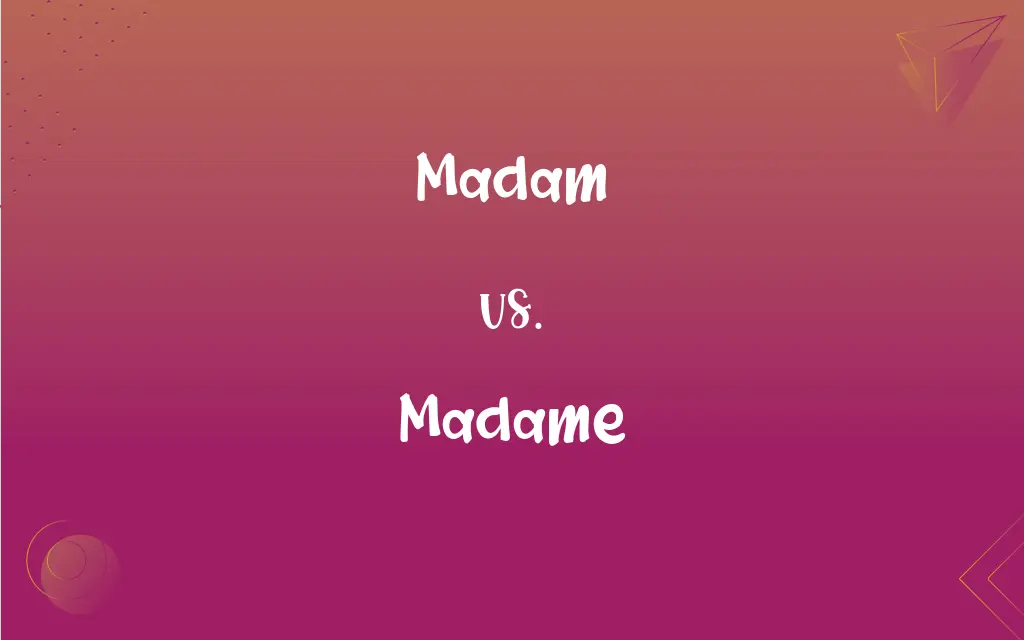Madam vs. Madame: What's the Difference?
Edited by Janet White || By Harlon Moss || Updated on October 2, 2023
"Madam" is a polite form of address for women in English. "Madame" serves a similar purpose in French and is also used in English in the titles of French women.

Key Differences
"Madam" is widely used in English-speaking countries as a polite term of address for women, equivalent to "Sir" for men. It’s often used in formal contexts or correspondence. Conversely, "Madame," while functioning similarly in French-speaking contexts, generally finds its application in English when directly referring to French women or in certain formal titles, illustrating a nuanced application between the languages.
In a conversational setting in English, "Madam" would be utilized to courteously address a woman whose name one does not know or to convey respect. It's a term steeped in politeness and formality. On the other hand, "Madame" often maintains its French pronunciation when used in English and is typically reserved for specific contexts or to maintain the native title of a French woman, demonstrating a subtle cultural and linguistic deference.
"Madam" can also precede the title of a high-ranking woman in specific contexts, such as "Madam President" or "Madam Secretary" in the United States, underscoring a position of authority and respect. Contrarily, "Madame" in English contexts often becomes a specified title for French women, such as "Madame Curie," adhering to the original French format and respecting its origins and applications.
In scenarios involving hospitality or customer service in English-speaking nations, it is common to use "Madam" to respectfully address female patrons. It signals a universal and formal address toward women in these interactions. Whereas "Madame" might be utilized in English primarily when the addressed woman is French or in specific titles like "Madame Tussauds," indicating a narrower and culturally specific application.
Comparison Chart
Language Origin
English
French
ADVERTISEMENT
General Use
Polite form of address in English.
Used in French and for French titles in English.
Cultural Association
Commonly used in English-speaking countries.
Associated with French language and culture.
Use in Formal Titles
Yes, e.g., Madam Secretary.
Yes, e.g., Madame Curie.
Pronunciation
[ˈmadəm]
[maˈdam] or [ˈmadəm], often maintaining French pronunciation.
Madam and Madame Definitions
Madam
Formal address.
How may I assist you today, Madam?
ADVERTISEMENT
Madame
French address.
Comment allez-vous, Madame?
Madam
Position title.
Madam President will address the nation tonight.
Madame
Referring to a French woman.
Madame Dufresne is expected at the gala.
Madam
Polite referral.
Would Madam like a table for two?
Madame
French female owner.
Madame is not pleased with the service.
Madam
Owner or proprietor.
Madam has decided to renovate the establishment.
Madame
French title.
Madame Curie made groundbreaking discoveries.
Madam
In correspondence.
Dear Madam, we received your inquiry.
Madame
In a specific name.
Madame Tussauds is a famous wax museum.
Madam
Pl. Mes·dames (mā-dăm, -däm) Used formerly as a courtesy title before a woman's given name but now used only before a surname or title indicating rank or office
Madam Ambassador.
Madame
Used as a courtesy title before the surname or full name of a woman, especially a married woman, in a French-speaking area
Madame Cartier.
Madame Jacqueline Cartier. See Usage Note at miss2.
Madam
Used as a salutation in a letter
Dear Madam or Sir.
Madame
Madame Used as a form of polite address for a woman in a French-speaking area.
Madam
Madam Used as a form of polite address for a woman
Right this way, madam.
Madame
Alternative form of madam
Madam
Madam The mistress of a household.
Madame
My lady; - a French title formerly given to ladies of quality; now, in France, given to all married women.
Madam
Madam A woman who manages a brothel.
Madame
Title used for a married Frenchwoman
FAQs
Is "Madam" only used to address women formally?
Predominantly, yes. "Madam" is a polite and formal way to address women.
Can "Madame" be used to address any woman in English?
It's uncommon and typically reserved for French women or specific titles/names.
Is it correct to use “Madame” in English educational contexts?
Rarely, unless referring to a French woman or a specific title. “Madam” or other titles might be more common in educational settings in English-speaking countries.
Does "Madame" always retain its French pronunciation in English contexts?
Often, yes. "Madame" may retain its French pronunciation especially in specific names or titles to maintain authenticity and respect its origin.
How do you abbreviate "Madam" in English?
"Madam" is abbreviated as "Ma'am" in English, especially in American English, and used in conversational speech.
Can "Madame" be abbreviated in English?
It's uncommon to abbreviate "Madame" in English, as it is usually reserved for formal titles or specific names where the full term is preferred.
Can "Madam" precede a surname in English?
Rarely. "Madam" usually stands alone or precedes a title, while "Mrs." would precede a surname.
In which English contexts is “Madame” most frequently utilized?
“Madame” is primarily used in English when addressing French women, utilizing French titles, or naming entities, such as “Madame Tussauds”.
Can “Madam” be utilized to address all age groups?
Typically, “Madam” is utilized for adult women, although it’s chiefly a matter of cultural and situational appropriateness.
Is "Madame" used in legal documents in English?
Rarely, unless it's maintaining the title of a French woman or entity, like "Madame Curie".
Is "Madam" used in the UK?
Yes, "Madam" is a polite and formal way to address women in the UK, similar to its use in other English-speaking countries.
How is "Madame" used in Canada, which has both English and French-speaking populations?
In Canada, "Madame" is common in French-speaking areas as a polite address, while "Madam" might be utilized in English-speaking regions.
Can “Madame” be used to imply authority in an English context?
Not commonly. In English, "Madame" is more culturally specific and not widely used to imply authority, unlike “Madam” in specific contexts.
Is “Madame” used in international English communication?
“Madame” might appear in international communication, especially in contexts involving French-speaking countries or individuals.
Is "Madam" used in business correspondence?
Yes, "Madam" is often used in formal business correspondence when addressing a woman whose name is unknown, for example, "Dear Madam,".
Can “Madam” refer to the mistress of a household?
Historically, yes. “Madam” could refer to a woman in charge of a household or establishment, though this use is somewhat antiquated.
How prevalent is the use of “Madame” in American English?
“Madame” is not prevalent in American English and is usually reserved for specific titles, French entities, or addressing French women.
Is "Madam" considered a respectful address in modern language?
Absolutely, "Madam" continues to be a respectful and formal mode of addressing women.
Is “Madam” utilized in legal language?
Occasionally. “Madam” may be used in legal documents or courtrooms to formally address a female party with respect.
Is “Madam” used globally within English-speaking countries?
Yes, “Madam” is widely recognized and utilized as a formal address for women in English-speaking nations.
About Author
Written by
Harlon MossHarlon is a seasoned quality moderator and accomplished content writer for Difference Wiki. An alumnus of the prestigious University of California, he earned his degree in Computer Science. Leveraging his academic background, Harlon brings a meticulous and informed perspective to his work, ensuring content accuracy and excellence.
Edited by
Janet WhiteJanet White has been an esteemed writer and blogger for Difference Wiki. Holding a Master's degree in Science and Medical Journalism from the prestigious Boston University, she has consistently demonstrated her expertise and passion for her field. When she's not immersed in her work, Janet relishes her time exercising, delving into a good book, and cherishing moments with friends and family.
































































